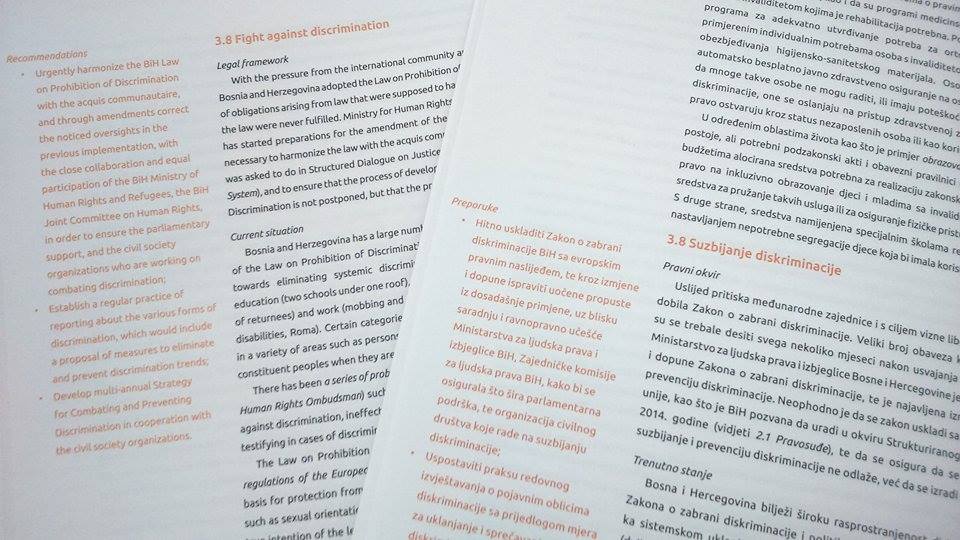 Legal framework
Legal framework
With the pressure from the international community and with the goal of visa liberalization, Bosnia and Herzegovina adopted the Law on Prohibition of Discrimination in 2009. A large number of obligations arising from law that were supposed to happen a few months after the adoption of the law were never fulfilled. Ministry for Human Rights and Refugees of Bosnia and Herzegovina has started preparations for the amendment of the Law on Prohibition of Discrimination. It is necessary to harmonize the law with the acquis communautaire of the European Union, as Bosnia was asked to do in Structured Dialogue on Justice for BiH in May 2014 (see chapter 2.1 Judicial System), and to ensure that the process of developing the Strategy for Combating and Preventing Discrimination is not postponed, but that the process is started immediately.
Current situation
Bosnia and Herzegovina has a large number of cases of discrimination despite the existence of the Law on Prohibition of Discrimination and policies in specific areas that should work towards eliminating systemic discrimination. Discrimination is recorded particularly in education (two schools under one roof), employment (on the basis of political affiliation, status of returnees) and work (mobbing and sexual harassment), social and health care (people with disabilities, Roma). Certain categories of people are exposed to multiple discrimination, and in a variety of areas such as persons with disabilities, Roma, LGBT, returnees, members of the constituent peoples when they are in the minority in a territory, etc. There has been a series of problems in the application of the law (see chapter 1.6 Institution of Human Rights Ombudsman) such as short deadlines for instituting proceedings for protection against discrimination, ineffective protection against retaliation in a case of discrimination and testifying in cases of discrimination.
The Law on Prohibition of Discrimination is not harmonized with the non-discriminatory
regulations of the European Union. The Law does not list some characteristics as potential
basis for protection from discrimination, such as age and disability, while the listed grounds
such as sexual orientation or sexual expression have not been defined and do not reflect the true intention of the legislature to prohibit discrimination against LGBT people. The Law also contains a wrong definition of exemption from the principle of equal treatment.
At the practical level institutions, especially the institutions in which everyday citizens
demand their rights, lack institutional policies and rules of procedure for handling cases of
discrimination. Neither the institutions nor the courts have mandatory and regular education on the Law on Prohibition of Discrimination. Therefore a new legal doctrine for Bosnia and Herzegovina, such as transfer of the burden of proof is arising in court processes. Problems are arising in jurisprudence because of ignorance and the failure to apply the test for discrimination as it has been established by the European Court of Human Rights. The Institution of Human Rights Ombudsman in Bosnia and Herzegovina, as a central institution for the protection against discrimination cited lack of human and financial resources necessary for implementation of the Law on Prohibition of Discrimination as a serious obstacle to the application of this decree.
The state budget, adopted in May 2015, once again does not plan special funds for the
Department for Elimination of all Forms of Discrimination within the Institution of Ombudsman, although the Law assumes its existence.
Recommendations
• Urgently harmonize the BiH Law on Prohibition of Discrimination with the acquis communautaire, and through amendments correct the noticed oversights in the
previous implementation, with the close collaboration and equal participation of the BiH Ministry of Human Rights and Refugees, the BiH Joint Committee on Human Rights, in order to ensure the parliamentary support, and the civil society organizations who are working on combating discrimination;
• Establish a regular practice of reporting about the various forms of discrimination, which would include a proposal of measures to eliminate and prevent discrimination trends;
• Develop multi-annual Strategy for Combating and Preventing Discrimination in cooperation with the civil society organizations.
This article is part of Alternative Progress Report 2015: political criteria.